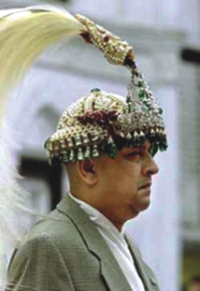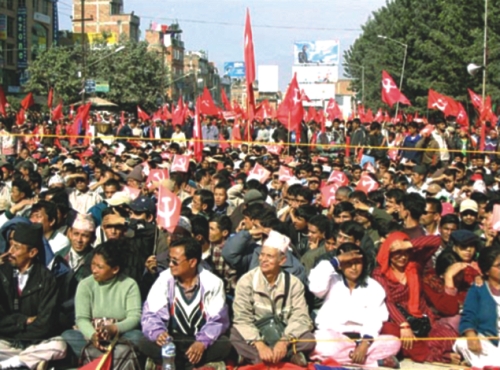Sout Asia
Legacy of Insanity in Nepal
Paul Danahar
It required an act of insanity to put King Gyanendra on the throne of Nepal. If reason had prevailed "Prince" Gyanendra would still be living in the shadow of his widely respected brother King Birendra.
 King Gyanendra's son, Paras, would still be the object of derisive gossip among Kathmandu's intellectuals who, then at least, were confident that the playboy prince would never get his hands on the reins of power. And none of the recent protests would have happened. But on June 1, 2001 reason stepped aside for madness. King Gyanendra's son, Paras, would still be the object of derisive gossip among Kathmandu's intellectuals who, then at least, were confident that the playboy prince would never get his hands on the reins of power. And none of the recent protests would have happened. But on June 1, 2001 reason stepped aside for madness.
King Birendra's son Prince Dipendra staggered down the stairs of the royal palace in a drunken stupor, walked into the drawing room where most of his family were spending the evening and opened fire with an M-16 assault rifle. King Birendra, Queen Aishwarya and seven other members of the royal household were cut to pieces.
At a stroke Gyanendra, who at that stage in his life must have resigned himself to a bit part in Nepalese history, was shuffled up the pack to assume the kingdom. And things have been going down hill ever since.
It is hard to find anyone in Kathmandu that does not think King Gyanendra's handling of the pro-democracy protests over recent weeks was disastrous. In a matter of days he managed to turn good natured pro-democracy demonstrations into fervent anti-monarchy riots. Even the policemen in charge of beating back the crowds told me of their frustration at the king's actions.
And senior members of the king's last line of defence, the Royal Nepalese Army, assured me that, if it had come to the crunch, their troops would not have opened fire on the demonstrators.
Nepalis have told me in the past that they have been cursed with two things - terrible poverty and even worse politicians. It is the latter that have so far saved King Gyanendra from being toppled from his throne.
Every successful revolution, from Castro in Cuba to Mandela in South Africa, has had a face symbolising the struggle - someone willing to give their life for the revolution, someone the people on the streets will die for. But members of the opposition leadership in Nepal are so old they can barely walk let alone lead a revolution.
Ever since 1990, when the people of Nepal first won their democratic rights, the same politicians time and time again have, in the eyes of many Nepalis, let them down.
There was a moment on the last Saturday afternoon of the protests that encapsulated the problem when the crowd surged into the centre of the capital, well inside the "shoot on sight" curfew area and within a mile of the royal palace.
Tens of thousands of them jammed into a junction which had both ways blocked by the police, who were vastly outnumbered. One road led to the palace. The right man or woman at that time, leading that crowd, could probably have taken those people to the king's doorstep.
Instead the crowd was leaderless. The police opened the other road, the crowd cheered their small victory and they all streamed by, the momentum was lost. The king was saved, for the time being.
In the end history may show that it was a very unremarkable man that led Nepal towards a republic. Basu Ghimere was, according to his wife, a "simple" carpenter who loved his four-year-old son.
He was beaten and shot dead on the streets of Kathmandu in the volatile Kalanki neighbourhood when police opened fire on what had started out as a peaceful demonstration. Mr Ghimere was not the only one to die and it was not his actual death that marked a potential tipping point.
It was the desecration of his funeral rights in what is the only country in the world where Hinduism is the official religion that enraged the crowds in Kalanki to commit the worst acts of rioting of the whole protest movement and ultimately force the monarch to retreat.
The king of Nepal is supposed to be an incarnation of the Hindu God Vishnu. It is for that reason the kings have been so revered down the ages by their subjects. But this king instructed or allowed his security forces to carry out one of the grossest insults to the Hindu faith one can imagine.

His police in full riot gear snatched the lifeless body of Mr Ghimere and cremated it without the consent or knowledge of his wife and family. I was in Kalanki when this news came through and I saw the effect it had on what had until that point been a peaceful crowd. It was then that King Gyanendra lost his godliness in the eyes of those present. It was at that moment, perhaps, that King Gyanendra's rule undermined the monarchy perhaps beyond the point of redemption. Rubbing his hands over all of this must be the Maoist leader Prachanda. He has announced a three-month ceasefire on the grounds that the first act of the newly-reinstated parliament will be to sort out a constitutional assembly and decide what role, if any, the monarchy should now play. Anywhere else, the best way out of a mess like this for the monarchy would be abdication and a new king. But the king's son Paras is disliked by more people than he is. I am one of the few journalists to have ever met Mr Prachanda. His interview with the BBC in January was his first venture into public relations.
Until this year his face had never been seen by the public. Mr Prachanda was doing his best to change his bogeyman image and began his interview by promising to grudgingly accept a role for the king if it was the will of the people. But by the end he was mumbling asides to his companion complaining about not being asked any "ideological questions about the revolution".
And then he could not help but promise to execute King Gyanendra if he ever got his hands on him. Last week the US ambassador to Nepal raised the spectre of King Gyanendra being forced to flee his kingdom clinging to the bottom of a helicopter.
The king's climb-down in restoring parliament might have saved him and his family from ignominious exile or even death. But whatever comes out of the debate over a new constitution, it seems the minimum that must be agreed to avoid more conflict is that the king's days of involving himself in politics must be over for good.
Paul Danahar is BBC
South Asia bureau editor. Copyright (R) thedailystar.net 2006 |
